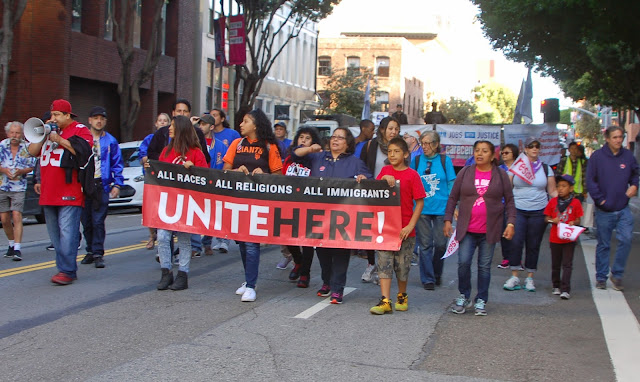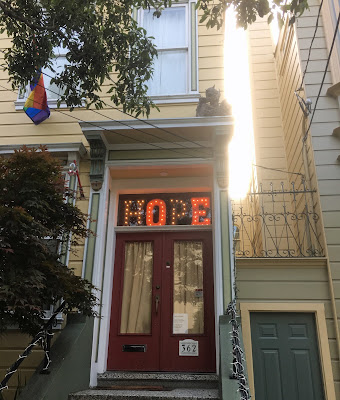A friend fighting cancer responded to House passage of the GOPer Trumpcare bill with this:
The best I can read it, the Republicans in the house just told me that I'm a bad human being for having a pre-existing condition and that I should simply go away and die. It's God's will and they want to help speed the process along.
It all feels so familiar. This is exactly what the early days of the AIDS epidemic felt like to gay men, other queers, and their friends.
Doctors noticed that something was killing a few gay men in Los Angeles in 1981. By the end of that decade,
160,969 cases of AIDS were reported, leading to 120,453 deaths. And this wasn't just an epidemic among relatively affluent white gay men. In
1990 there had been 45,446 cumulative AIDS diagnoses among Blacks and 28,576 cumulative AIDS deaths among Blacks. The disease was becoming a major danger to the female partners of infected men of all races and was known to be passed on to their babies.
At first, nothing was known about this new plague except that more people died each year. Would everyone eventually catch it? Early on, AIDS -- the conditions arising from infection by the HIV virus -- was identified as a sexually transmitted illness. Or, for many, as something
those people contracted because of having
sex. SEX! And so, there must be something bad about those people; they were intrinsic wrongdoers; they probably deserved it. It took his buddy Rock Hudson dying to move President Ronald Reagan to as much as mention the exponentially increasing plague. Infected kids (in those days usually hemophiliacs victimized by an untested blood transfusion) were barred from public schools; dentists refused to treat HIV-infected patients; so did some medical doctors and nurses. Basketball phenom Magic Johnson lost his career when he tested positive; other athletes feared being in a locker room with him. And, too often, HIV carriers were condemned as sinners from conservative pulpits.

And concurrently, brave activists, many fighting the virus themselves, demanded that their neighbors grow up and recognize the difference between illness and moral depravity. It was a tough lift, facing both a panic about an unknown threat and concurrent homophobia. Yes, people who had sex, even unfamiliar sex, could be innocent people. Innocent people who revealed the story of their disease in order to raise awareness like Bobby Campbell (pictured on an early Newsweek cover). Innocent people like filmmaker
Marlon Riggs who struggled with his own community's distress at admitting that Black homosexuals were part of the family as well as with rejection by a wider society that condemned carriers of a virus.
And these struggles, along with the work of doctors and scientists who found treatments, taught far more of us that disease is unmerited affliction, not a sign of moral turpitude. The nightmare of AIDS-HIV served as a wake up for many.
Not for everyone. Stigmatization of disease remains strong, especially among people who call themselves evangelical Christians and in red states which did not expand Medicaid under Obamacare to cover their neediest citizens. That is, Trump voters. But the fight for care for the victims of the "gay plague" helped weaken notions such as what Alabama Republican Mo Brooks blurted out after voting for Trumpcare:
“My understanding is that it will allow insurance companies to require people who have higher health care costs to contribute more to the insurance pool that helps offset all these costs, thereby reducing the cost to those people who lead good lives, they’re healthy, you know, they are doing the things to keep their bodies healthy,” he said. “And right now, those are the people who have done things the right way that are seeing their costs skyrocketing.”
TPM
Mark Joseph Stern and Perry Grossman argue that
Americans Now View Health Care as a Right. Republicans Can’t Change That. A new
Pew poll finds that 60 percent of us agree. These writers' argument is that exposure to Obamacare has deeply planted the idea that healthcare is for all, not about who is deserving and who is not. They make an analogy of our gradual progress toward accepting that marriage is a private right, first between individuals of different "races," and later of individuals, even of the same sex.
But I think the teaching experience of the AIDS crisis may have weighed even more in creating the consensus Republicans are seeking to overthrow. GOPers aim to grab back 800 billion dollars from health care to give to rich people in tax cuts. AIDS taught a lot of people who didn't want to learn it that we're all in this together and that illness doesn't make moral distinctions between victims.
Some Republicans are behind the curve on this, but they would be wise to catch up. Any of them, and people they love, can get cancer or some other "pre-existing condition."














































